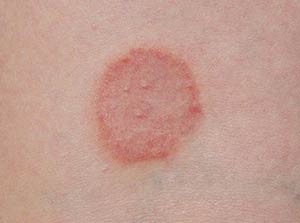Ringworm
Information
Ringworm is a type of skin infection, which is caused by a fungi.
Fungus thrives in warm, moist areas, such as locker rooms, mats,
gyms, swimming pools and in skin folds. Be aware that the fungi may
be present without any visible symptoms.
- A common misconception is that this
condition is caused by a worm. In fact, Ringworm is a common
fungal infection of the skin and is not due to any type of worm.
- The medical term for ringworm is tinea. The
condition is further named for the site of the body where the
infection occurs.
- Ringworm causes a scaly, crusted rash that
may appear as round, red patches on the skin. Other symptoms and
signs of ringworm include patches of hair loss or scaling on the
scalp, itching, and blister-like lesions.
- Ringworm can be successfully treated with
antifungal medications used either topically or orally.

Preventing Ringworm on your
Skin... Maintain a high level of personal hygiene
Common Advice to prevent ringworm includes:
- Avoid sharing of any articles of clothing,
sports equipment, towels, or sheets.
- Wash all clothes in hot water with
fungicidal soap after suspected exposure to ringworm.
- Avoid walking barefoot and wear appropriate
protective shoes in areas suspected of existing fungal cultures
including the beach, gyms, dojos, locker rooms, and athletic mat
covered locations.
- After spending time in places where there
is a potential risk of exposure, one should wash with an
antibacterial and anti-fungal soap or one that contains Tea Tree
Oil, Tea Tree Oil contains active ingredients including mainly
terpinen-4-ol. It is this compound which is thought to be the main
reason for Tea Tree oilís effectiveness and itís antimicrobial
properties. Additionally, this compound has been noted for the
successful treatment of fungal infections.
|



 Ringworm
| Things to Know
Ringworm
| Things to Know